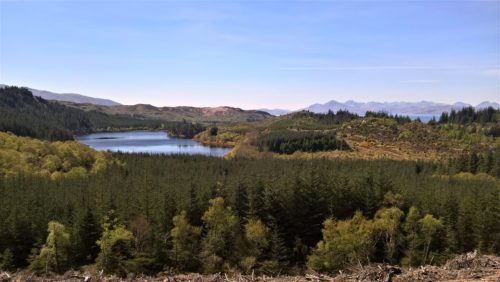This website uses cookies so that we can provide you with the best user experience possible. Cookie information is stored in your browser and performs functions such as recognising you when you return to our website and helping our team to understand which sections of the website you find most interesting and useful.
This project helped to:

Meet government targets for planting

Support the wood processing industry
Scottish farmland returns back to a forest
The land was purchased from a local farmer by a Tilhill client with the intention of establishing a well-designed commercial woodland with the main focus being on investment return.
To inform the woodland design process and support the application for permission to plant the proposed woodland the Environmental Impact Assessment (EIA) process had to be followed. This saw a very detailed Environmental Statement (ES) produced and approved.
This key document was generated through a team effort which called upon every aspect of Tilhill’s in-house expertise: from the Ecology Team to Forest Managers and Senior Management. Some of the more specialist survey and report work, archaeology, soils and habitat was outsourced to expert advisors.
After almost three years of planning and hard work, the Environmental Statement and grant application was approved. This approval gave permission to plant 1.2 million conifers which will reach maturity and produce timber in 35 to 40 years’ time.
The key commercial species is Sitka spruce, accounting for 70% of all the trees to be planted. These trees will provide timber for Scotland’s ever developing timber processing sector with the raw materials going for conversion to construction timber, pallet boards, paper and panel board production, among other outlets.
A significant element of Scots Pine planting has been incorporated to create visual diversity and enhance the habitat value of the woodlands, along with Western Red Cedar and productive broad leaves on the lower, more sensitive, valley bottom. All of the Sitka spruce is from improved stock, seed orchard and full sibling. We also used improved Cedar stock.
One of the biggest operational challenges facing the Tilhill team was access and transportation of materials across the vast 4km wide site as there weren’t any roads and the terrain was very rough and included many deep water courses.
Challenges going forward will include minimising browsing damage of the young trees by deer and other herbivores as the site is surrounded by forest. A significant area of the softer, more palatable species on the lower ground has been protected by the erection of deer-proof fencing and the installation of vole guards.
Community consultation was a very important part of the planning process and included public drop in days.
Tilhill offers a complete woodland management service to forest or woodland owners, tailored according to their individual needs. If you have a similar project, our qualified and experienced forest managers can undertake every aspect of caring for your property. Get in touch today using the contact form below.
Back to all case studies










